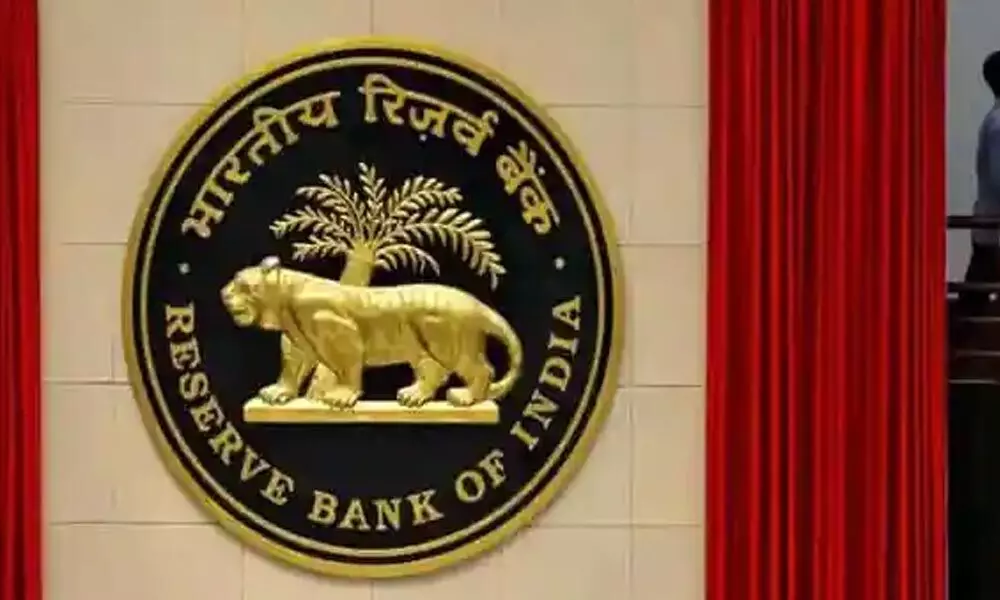Live
- GMR Airports Unveils AI-Powered Digital Twin Platform to Transform Airport Operations
- India poised to become leading maritime player: PM Modi
- Top Causes of Kidney Stones and How to Recognize Silent Symptoms
- India’s renewable energy capacity logs 14.2 pc growth at 213.7 GW
- Winter Session of Odisha Assembly adjourned sine die
- Biden calls Trump's tariff approach 'major mistake'
- After Drama Over Eknath Shinde’s Chief Minister Race, Maharashtra Cabinet Formation Faces New Tensions
- Egyptian FM, Blinken discuss recent developments in Syria
- Iran's supreme leader says Syria's developments result of US-Israeli 'plot'
- Elon Musk to Purchase $100 Million Luxury Mansion Next to Donald Trump's Mar-a-Lago, Report Reveals
Just In
Private consumption key to GDP growth


Reserve Bank of India
RBI says private investment will also play key role in economic recovery
New Delhi: AMID uncertainties arising out of the second wave of Covid-19, the Reserve Bank on Thursday said that a durable revival of private consumption and investment would be critical for sustaining economic growth post-pandemic.
Observing that 2020-21 has left a scar on the economy, RBI in its annual report said, "in the midst of the second wave as 2021-22 commences, pervasive despair is being lifted by cautious optimism built up by vaccination drives."
The second wave of the pandemic has prompted revision of growth projections for the current fiscal and the consensus appears to be gravitating towards RBI's forecast of 10.5 per cent, the report added. The pandemic, RBI cautioned, "is the biggest risk to this outlook. Yet, upsides also stem from the capex push by the government, rising capacity utilisation and the turnaround in capital goods imports."
In a separate box on what would drive growth recovery after the crisis, RBI said, "for a self-sustaining GDP growth trajectory post-Covid-19, a durable revival in private consumption and investment demand together would be critical as they account for around 85 per cent of GDP." Typically, it added, post-crisis recoveries are led more by consumption than investment. "However, investment-led recoveries can be more sustainable and can also lift consumption in parts by better job creation. In either case, private demand plays a pivotal role," the report added. The RBI has also cautioned banks to closely monitor their bad loans and prepared themselves for higher provisioning in the light of the Supreme Court lifting ban on non-performing asset (NPA) classification and outbreak of the second Covid-19 wave.
The waiver of compound interest on all loan accounts which opted for moratorium during March-August 2020 may put stress on the financial health of banks, the report said. The apex bank, however, expressed confidence that banks are better positioned than before in managing stress in balance sheets in view of higher capital buffers, improvement in recoveries and a return to profitability."Stress tests indicate that Indian banks have sufficient capital at the aggregate level even in a severe stress scenario. Bank-wise as well as system-wide supervisory stress testing provide clues for a forward-looking identification of vulnerable areas," RBI said in its annual report 2020-21.
The report has emphasised the need for banks to keep a tab on the NPAs and accordingly earmark capital for the provision. The report also revealed that the banknotes in circulation witnessed higher than average increase during 2020-21 on account of precautionary holding of cash by people induced by Covid-19 pandemic.
The value and volume of banknotes in circulation increased by 16.8 per cent and 7.2 per cent, respectively, during 2020-21 as against an increase of 14.7 per cent and 6.6 per cent, respectively, witnessed during 2019-20, said the report.
In value terms, the share of Rs 500 and Rs 2,000 banknotes together accounted for 85.7 per cent of the total value of banknotes in circulation as on March 31, 2021, as against 83.4 per cent as on March 31, 2020. On inflation, the report said supply-demand imbalances may continue to exert pressure on food items like pulses and edible oils, prices of cereals may soften with bumper foodgrain production in 2020-21. "Pressures from food items like pulses and edible oils are likely to persist in view of supply-demand imbalances, while cereal prices may continue to soften with the bumper foodgrain production in 2020-21," it said.
RBI Observations
♦ Pervasive despair is being lifted by cautious optimism built up by vaccination drives
♦ Consensus gravitating towards forecast of 10.5%
♦ Pandemic the biggest risk to economic outlook
♦ Post-crisis recoveries led more by consumption than investment
♦ Banks to keep a tab on the NPAs and accordingly earmark capital for the provision

© 2024 Hyderabad Media House Limited/The Hans India. All rights reserved. Powered by hocalwire.com






